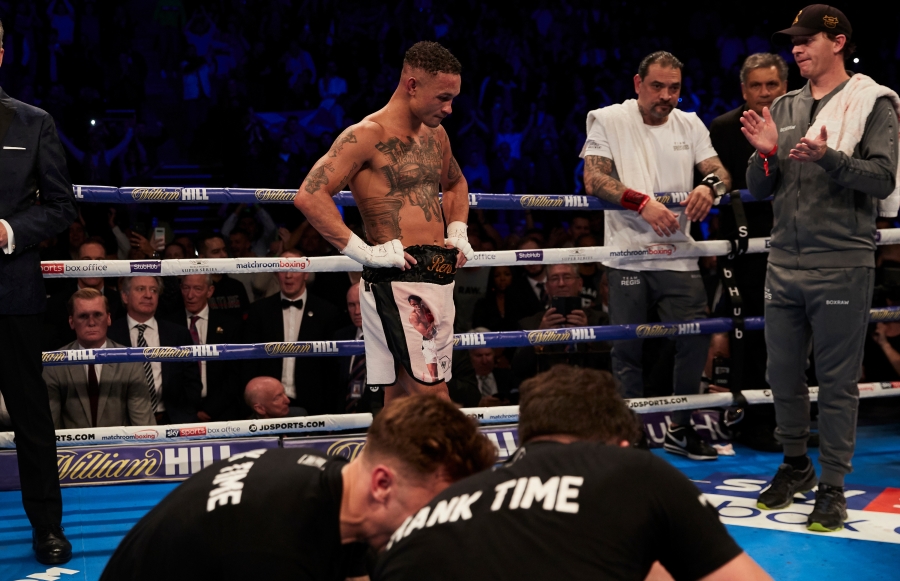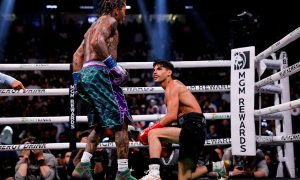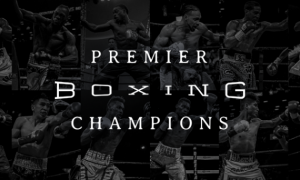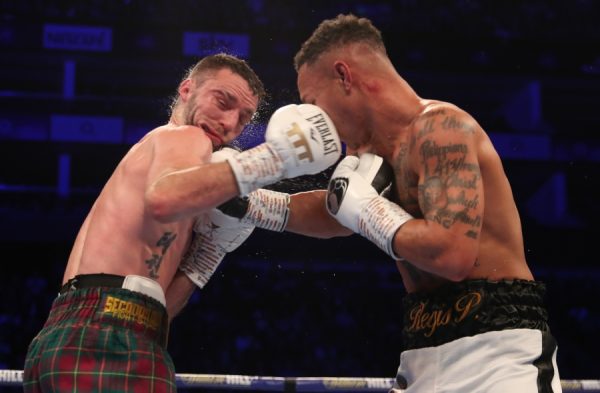
Last Saturday night at London’s O2 Arena one of boxing’s good-spirited fighters, Regis Prograis, lost his WBA Super Lightweight title – and undefeated status – in one of the year’s most anticipated bouts. The bout, a championship unification fight against IBF champion Josh Taylor, was the culmination of a year-long commitment to the World Boxing Super Series.
Let’s start with a few obvious realities.
Impatience, from both fighters and fans, regarding the WBSS’ ability to finalize this season’s final bouts began to crop up in the spring, so nobody really wanted the conclusion of Prograis-Taylor to be a draw.
Watching the fight on TV it felt like the judges determined the right winner in Taylor. But, and while scoring is subjective, aren’t judges seated in the perfect position to deliver a better (or more informed) decision than us viewers at home?
Did I already mention that the boxing world really wasn’t mature enough to deal with the Ali Trophy not being awarded to either finalist?
So look, nobody is in a major uproar because Taylor’s hand was raised at the end of a phenomenal unification title fight. A fight that will easily contend for Fight of The Year. Nobody’s suggesting that an American was done dirty over in the UK. Notwithstanding my “An American Werewolf in London” campaign that never quite got off the ground.
And actually, now that I’ve tracked down an image of the fight’s actual scorecards, and realize Prograis actually won the eighth round on each of the three judge’s cards the main idea of this piece changes. Slightly.
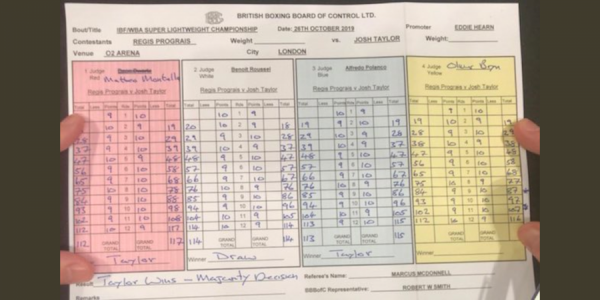
Before an interview call with Prograis on Monday, Sirius XM’s co-host of Fight Nation’s boxing show At The Fights, Randy Gordon, stated that Prograis didn’t win a single round on all three scorecards. That was not true.
Prograis won the eighth round on all three scorecards – as well as the scorecard of the fourth judge. Upon hearing that discussion in the show’s opening, I thought Prograis might have caught another one of boxing’s bad breaks, fully believing that he fought well enough have won at least one round in consensus fashion. In fact, that round should have been the 12th round.
In light of confirming that important fact, the point of this piece is that every single fighter is going to need some things, for lack of a better word, to go his/her way over the course their career. This becomes even more apparent when we get to assigning greatness to a fighter.
One of the game’s earliest bad breaks I witnessed, on HBO Boxing, was Marlon Starling’s stunning knockout loss to Tomas Molinares in July 1988. Starling appeared to have been knocked out after the bell in the sixth round. Replay confirmed it for viewers at home, but Starling exited the ring that night with his fifth loss, and without his WBA title. The decision was subsequently changed to a No Contest. According to follow-up New York Times piece in August the WBA declared Molinares as champion, disregarding the New Jersey State Athletic Control Board’s findings which nullified the victory over Starling. In February Starling bounced back by stopping Lloyd Honeyghan to win the one-loss champion’s WBC title.
Of course, for fans who came of age with the sweet science around the same time as I, Mike Tyson either suffered a bad break with the seemingly long count for James “Buster” Douglas with six seconds to go in the eighth round of their fight in February 1990; Or, Tyson was wronged long before fight night when the inept team was assembled to accompany him in his defense of his WBA, WBC and IBF titles in Tokyo.
Some would argue Floyd Mayweather’s “TBE” status was achieved, in part, with catching a break with a unanimous decision in his first fight versus Jose Luis Castillo in April 2002. Perhaps Marcos Maidana – if only in the view of the opps of the “TBE” movement – caught a bad break in his majority decision loss to Mayweather in May 2014. Or, maybe that was a great break that resulted in a lucrative rematch four months later where afterwards Maidana walked out of the ring and into retirement. Andre Ward hustled his way to a favorable break in November 2016, getting off the canvas to pull off a comeback win versus Sergey Kovalev.
Last Saturday, judge Alfredo Polanco – the judge with the sensible 115-113 card the majority of fans seemed the most comfortable with – was the only judge that scored the 12th round for Taylor. Had Polanco went along with the rest of the world, his card would have been 114-114 along with the outcome for judge Benoit Roussell. A second even card changes the outcome to an extremely anticlimactic majority draw. Certainly we didn’t wait a year only to need another… Well, actually there was a fourth judge (116-112 for Taylor in the image above) with a card intended to serve as a tie-breaker. So this piece really is all for naught.
Taking a closer look at Polanco’s card is an interesting study in judging – or maybe the difficulty of the task. In the toughest parts of the fight to score, the opening rounds where the action tends to be more tactical, Polanco scored the first frame for Prograis. Him and Roussel had the same winner. In the second round Roussell, third judge Matteo Montella, as well as the tie-breaker judge all scored the round for Prograis. Polanco stood alone with Taylor. Round three was the opposite, with Polanco being the only one of the four who scored the round for Prograis.

Montello was the lone wolf in rounds four and five, scoring them for Taylor and Prograis, respectively. Taylor won rounds six and seven on all cards. Remember there is a convention in Prograis’ favor in the eighth. Taylor sweeps all of the cards again in rounds nine and ten (Taylor had a total of four unanimous rounds). Montello – the judge with 117-112 outlier card – scored his sixth straight round for Taylor in the 11th, with only the tie-breaker card in agreement. Then we get to the 12th and final round where Polanco is the lone wolf with Taylor as his winner.
That’s a tough break for Prograis who responded with six valiant minutes after hearing his corner’s opinion that the championship rounds were must-haves in order to win the fight. But, did Polanco give Prograis a clear Taylor round in the third?
Frankly, while the Polanco’s winner for the 12th round seems like a head-scratcher, I find it hard to question his performance of his duties altogether. In fact, the overall decision seems to be the reason why boxing has three judges – the right winner invariably comes out in the wash.
Despite the four categories that judging is dependent on – clean punches, effective aggressiveness, defense and ring generalship – the way that these are all applied and/or valued is not an exact science. In fact, in a closely contested round, I’ve often heard the determining factor was a matter of, “Fighter A landed the best punch in the round.” To make matters more confounding, scoring a 10-10 round like Montello’s card in the eighth round (Prograis’ best per the judges) is a frowned upon practice. We’re almost forcing some fighter to catch a bad break!
In Prograis’ case, he stood tall in his moment of defeat, offering no excuses while standing within earshot of Taylor during the post-fight interview. He even conceded that Taylor was the better man that night. During his call into At The Fights Monday, October 28 the New Orleans native remained upbeat regarding both his performance and his next move.
“It was just my fault,” he admitted, “I knew that coming over here from America, I felt like I wasn’t going to get the decision unless I knocked him out. And I really felt like I could knock him out.
I think my biggest thing was that I stood and fought with him for too much, and that was his game too. He was a very good inside fighter, and I thought that I could really break him down and get him tired for the later rounds. And, he was still there, basically.
I think the first four rounds, for sure, I went out there and I out-boxed him clearly. Then he started bringing the fight to me. He came to me, and I wanted to bring the fight to him, I wanted to just go there and trade, and make it a war.
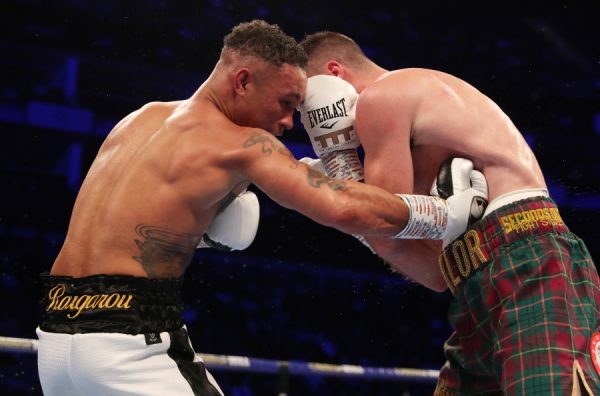
Same as it is with any sport, the more an athlete works before and during the game, contest or match they stand a better chance at influencing what their break is – a boost or a step backwards. Prograis understands he lost the fight to his own penchant to go to war, when the battle of the middle rounds against Taylor ultimately called for what he believes was his superior boxing ability.
Bad break or learning experience, Prograis’ “0” is forever gone, along with the world title he worked so hard to capture. His spirit sounds no worse for wear, and since he willingly accepted the format of the WBSS and whatever circumstances it presented him, hopefully in the near future the business of boxing can be worked out so that him and Taylor can run it back. I can’t wait to see what’s next for the Rougarou, the warrior, boxing’s latest break wasn’t able to leave broke.
All photos by Mark Robinson/MDR Photography





